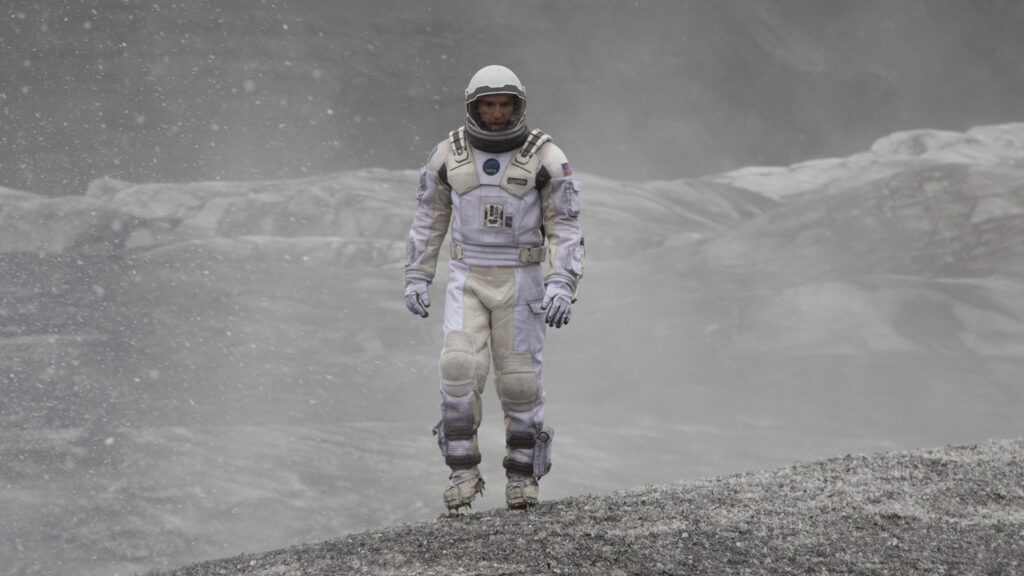Christopher Nolan’s sci-fi thriller Interstellar was recently rereleased in theaters to celebrate the film’s 10th anniversary since its original release in November 2014. I saw it for the first time about eight years ago when I was fifteen, after hearing from multiple sources that it was one of the best movies of any genre of all time. At that age, I couldn’t understand the gravity (ha, get it?) of the scientific and philosophical significance of the plot, and thus didn’t feel the same way as others about the film. I didn’t think it was a bad film, it just wasn’t apparent to me what was so groundbreaking about it at the time.
Nevertheless, due to my lack of understanding, I reluctantly gave in to the hype and have been giving rave reviews about the film whenever it is brought up despite my true opinion differing, I wanted to fake like I was part of the crowd who could feel why the film was so impactful. However, with Interstellar coming back to theaters at a time in my life where I knew I could fully grasp the plot, I thought I would be fair to myself and give it another watch to truly determine if it’s worth the praise it was given.
Boy was I missing out when I was fifteen.
Interstellar is incredible. I’m known to have the attention span of a goldfish, so usually a movie like Interstellar that is just under three hours would be troublesome for me, but I was glued to the screen the whole time.
The film has everything you can ask for: jaw-dropping space cinematics that flourish on the big screen, a perfectly written plot that juxtaposes the close-knit, meaningful relationship between a father and his children with the infinitely large and empty nature of our universe, twists and turns that make you connect the dots to earlier scenes with astonishment and a masterpiece of a score by Hans Zimmer.
Not only should you watch it, but you NEED to watch it. Interstellar’s ability to provide themes about humanity’s place in the universe using digestible scientific and philosophical concepts is extraordinary.
The concept of time, for example, was heavily explored in the film through the theory of time dilation, which is the idea that time moves faster under certain gravitational pulls in space. In the movie, the main character Coop’s (Matthew McConaughey) “brief” mission to explore distant planets with the potential capability to support life ended up costing him 23 years of relative time, causing him to miss watching his children grow up.
Not only was this a cool plot device, but it also was effective on a deeper thematic level, highlighting how fleeting time is, how powerless we are against it and how it dictates our relationships. It also forces us to reflect on how we prioritize our time and what truly matters in the grand scheme of life.
Love and sacrifice are also key themes in Interstellar that were masterfully exhibited, most obviously through Coop’s love for his family guiding him on his mission to sacrifice his own well-being for the greater good of humanity. But also, Anne Hathaway’s character, Dr. Brand, delivers a powerful monologue about love, arguing that it is a force that transcends time and space.
In a film driven by scientific accuracy, this moment introduces a more metaphysical idea in alignment with existential philosophy: suggesting that human connection has an intrinsic power that science alone cannot explain. Coop’s love for his daughter Murphy ultimately guides him in the film’s climactic scene, where he realizes he can communicate with her through time itself.
Thus, Interstellar is more than just a sci-fi film. It’s a meditation on time, love, survival and the human experience. It challenges us to think beyond our immediate reality, question the limits of science and consider the forces, both seen and unseen, that shape our existence.
Being able to solve that puzzle as a viewer was deeply rewarding, and was one of those experiences where the enjoyment of the film went beyond the product itself, creating a deep self-reflection about my own life.
So, if you’re not one of those people who thinks it’s one of the best movies ever, do yourself a favor and watch it again. Just don’t blame me when you find yourself staring at the wall at 2 a.m., contemplating the meaning of life, time, love and why Matthew McConaughey is always on the sideline of Texas Longhorns football games.


